 On today's BradCast: In a bit of an earth-shaking statement issued to CNN late on Tuesday, which has echoed across the nation ever since, a spokesperson for New York's Attorney General said: "We have informed the Trump Organization that our investigation into the company is no longer purely civil in nature. We are now actively investigating the Trump Organization in a criminal capacity, along with the Manhattan DA." [Audio link to full show is posted below summary.]
On today's BradCast: In a bit of an earth-shaking statement issued to CNN late on Tuesday, which has echoed across the nation ever since, a spokesperson for New York's Attorney General said: "We have informed the Trump Organization that our investigation into the company is no longer purely civil in nature. We are now actively investigating the Trump Organization in a criminal capacity, along with the Manhattan DA." [Audio link to full show is posted below summary.]
The Manhattan District Attorney, Cyrus Vance, has been running a criminal grand jury probe of our disgraced former President and his business empire for almost two years, looking into, among other things, allegations of major bank and tax fraud crimes. The New York Attorney General, Letitia James, has also been investigating some of the same allegations of falsely-inflated values of certain real estate holdings in order to receive loans, while Trump reportedly under-valued many of the same properties in order to pay lower taxes. That would be fraud. But, until last night, the NY AG's probe was understood to be looking at civil violations of the law, not criminal ones. That has all now changed.
We're joined today by former Asst. U.S. Attorney for the District of Columbia, RANDALL D. ELIASON who, while serving as AUSA, was also Chief of the Public Corruption/Government Fraud section at DoJ. He is now a professor at George Washington University Law School, a contributing columnist at Washington Post, and writes about corporate and white collar crime at his own Sidebars Blog.
Given today's news, we have a lot of questions for him, beginning with the most fundamental: What is the difference between a criminal and a civil investigation? "The most important difference," Eliason explains, "is in a criminal case, people can go to jail. Only in a criminal prosecution can somebody actually lose their liberty. Of course, criminal cases have the higher burden of proof, as well. You've got to prove beyond a reasonable doubt to a unanimous jury. [In] civil cases the burden of proof is much lower, typically just a preponderance of evidence that you can establish the offense took place. So, civil cases can lead to hefty fines, but the stakes are lower, because at the end it's usually primarily about money. In a criminal case, you're talking about people possibly going to jail, and the stakes are much higher."
Beyond that, of course, we've got many more questions about the scintillating news out of James' office today:
- Why would NY state's civil probe turn into a criminal one?;
- If James' office has joined Vance's criminal probe, is her own civil investigation still moving forward at the same time?;
- Why would the NY AG announce this new development publicly at all?;
- Does anyone go to jail if a corporation is charged, rather than an individual?;
- Why does it matter if the Trump Organization paid its longtime Chief Financial Officer Allen Weisselberg and his sons (who are also employed by Trump) with free NYC apartments and private school tuition for their children?;
- Why is it a concern for prosecutors that Trump's company spent millions on consultants, including to his own daughter Ivanka while she was already employed at the company?;
- Are the various probes of Trump and his company taking longer than might be expected in cases such as these?;
- If Trump's former personal lawyer Michael Cohen was convicted and imprisoned by federal prosecutors for participating in a hush-money conspiracy "directed" by Trump, why hasn't Trump been charged yet for "directing" that criminal conspiracy not that he's no longer in office?;
- And, with all of Trump's looming legal concerns that we currently know of --- from New York to Atlanta to Washington D.C. --- would Eliason be more surprised if Trump has NOT been criminally indicted by this time next year or if he has been?
As you might expect, Eliason has a lot of helpful insight on all those questions and others today!
Next, West Virginia's Democratic Sen. Joe Manchin and Alaska's Republican Sen. Lisa Murkowski joined forces this week to issue a letter calling on leaders of both parties in the House and Senate to move forward with a measure to repair the Voting Rights Act of 1965 that was gutted by the U.S. Supreme Court in 2013. "Inaction is not an option," they write, "Congress must come together."
The effort comes as Manchin is the only Democrat in the Senate to have not signed on as a co-sponsor of the For The People Act (known as H.R.1 in the House and S.1 in the Senate). That is the Democrats' critical, omnibus election and campaign finance reform bill that would, among MANY other things, end gerrymandering, mandate automatic voter registration and early voting and curb the use of dark money in political campaigns. But it does not restore the critical provision in the VRA, gutted by SCOTUS, that mandate pre-clearance by the Dept. of Justice of new voting laws in jurisdictions with a long history of racial voter suppression. The John Lewis Voting Rights Advancement Act (or H.R.4) does that.
While Manchin is, so far, unwilling to support H.R.1, because he believes election reform bills must be bipartisan (all Republicans in the House voted against it, and all have opposed it so far in the Senate), this week's efforts with Murkowski seems to suggest he'd be open to support H.R.4, the John Lewis Act, or something akin to it.
I explain why that bill is currently on a separate legislative track from the For the People Act --- instead of simply combined with it --- and why Manchin appears to be under the absurd illusion that somehow at least ten Republican Senators would support any legitimate fix to the Voting Rights Act in order to allow such a bill to overcome a GOP filibuster in the upper chamber.
Finally, a "blockbuster" new climate report was issued on Tuesday by the International Energy Agency (IEA), a U.N. partner group that is traditionally, and notoriously, pro-fossil fuel. This report, however, offers a road map on how the world's energy needs can be met while still achieving net zero carbon emissions by 2050. As Desi Doyen explains, the plan mandates no new fossil fuel development beyond what is already in place. That's a stunning turnabout on its own from this particular agency, which also points out that we already have the technological innovation that is needed to achieve net zero in 30 years, but a significant portion of it is not yet ready (or is currently prohibitively expensive) for broad commercial use. Desi details the IEA's road map, what it signals, and what it will mean both politically and for the energy sector as the world continues to come to terms with our quickly worsening climate emergency...
(Snail mail support to "Brad Friedman, 7095 Hollywood Blvd., #594 Los Angeles, CA 90028" always welcome too!)
|


 Trump Admin's Endless Waste, Fraud, Abuse on Voting, at DOJ, by DOGE: 'BradCast' 1/20/26
Trump Admin's Endless Waste, Fraud, Abuse on Voting, at DOJ, by DOGE: 'BradCast' 1/20/26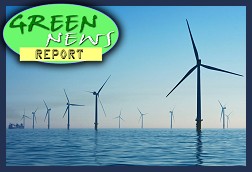 'Green News Report' 1/20/26
'Green News Report' 1/20/26
 Sunday 'Domestic Terrorist' Toons
Sunday 'Domestic Terrorist' Toons 'A Cornered Rat is a Dangerous Rat': Trump Terrorizes Minn., Menaces NATO, World: 'BradCast' 1/15/26
'A Cornered Rat is a Dangerous Rat': Trump Terrorizes Minn., Menaces NATO, World: 'BradCast' 1/15/26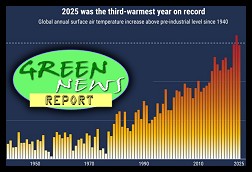 'Green News Report' 1/15/26
'Green News Report' 1/15/26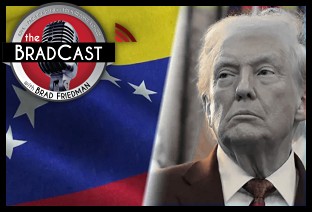 'This Isn't Close to Over': Mad King Trump in Venezuela (and Beyond): 'BradCast' 1/14
'This Isn't Close to Over': Mad King Trump in Venezuela (and Beyond): 'BradCast' 1/14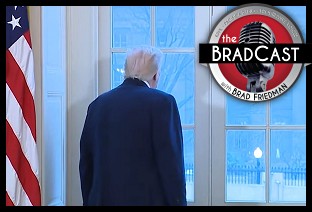 Things Getting Weirder as Trump Keeps Losing: 'BradCast' 1/13/26
Things Getting Weirder as Trump Keeps Losing: 'BradCast' 1/13/26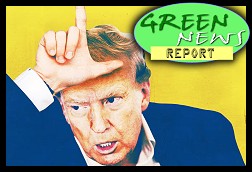 'Green News Report' 1/13/26
'Green News Report' 1/13/26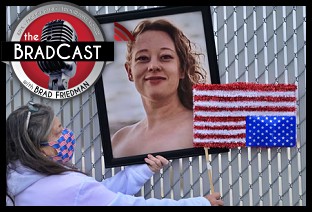 After ICE Murder in MN, Local Cops Disown Fed Policing Practices: 'BradCast' 1/12/26
After ICE Murder in MN, Local Cops Disown Fed Policing Practices: 'BradCast' 1/12/26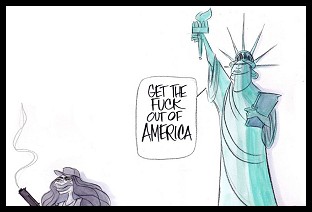 Sunday 'Ice Age' Toons
Sunday 'Ice Age' Toons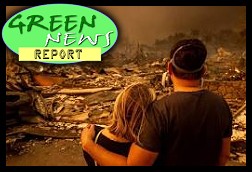 'Green News Report' 1/8/26
'Green News Report' 1/8/26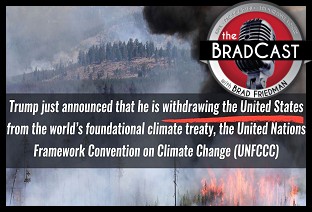 Trump to Congress, Climate, U.N., Rule of Law: DROP DEAD - 'BradCast' 1/8/26
Trump to Congress, Climate, U.N., Rule of Law: DROP DEAD - 'BradCast' 1/8/26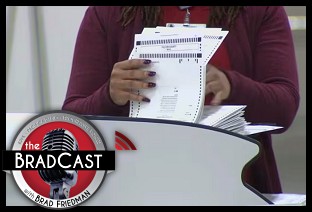 'Nonsense': Trumpers Claim 315k Fraudulent GA Votes in 2020: 'BradCast' 1/7/26
'Nonsense': Trumpers Claim 315k Fraudulent GA Votes in 2020: 'BradCast' 1/7/26 Jack Smith Testimony on Trump J6 Crimes, DOJ Weaponization: 'BradCast' 1/6/26
Jack Smith Testimony on Trump J6 Crimes, DOJ Weaponization: 'BradCast' 1/6/26 Trump War on Venez. is About Ego, Power, 'Alien Enemies Act': 'BradCast' 1/5/26
Trump War on Venez. is About Ego, Power, 'Alien Enemies Act': 'BradCast' 1/5/26 Have a Holly Jolly Somehow
Have a Holly Jolly Somehow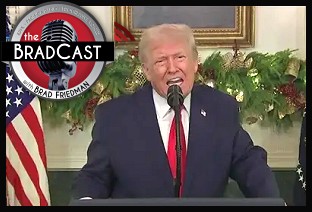 Old Man Shouts at People from WH for 20 Minutes: 'BradCast' 12/18/25
Old Man Shouts at People from WH for 20 Minutes: 'BradCast' 12/18/25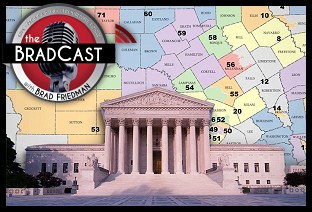 SCOTUS' How-To on Gerrymandering on 'Eve' of Election Year: BradCast' 12/17/25
SCOTUS' How-To on Gerrymandering on 'Eve' of Election Year: BradCast' 12/17/25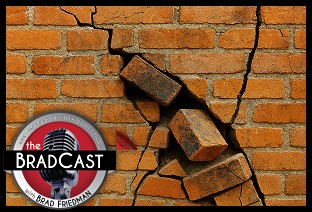 Bricks in the Wall: 'BradCast' 12/16/25
Bricks in the Wall: 'BradCast' 12/16/25
 VA GOP VOTER REG FRAUDSTER OFF HOOK
VA GOP VOTER REG FRAUDSTER OFF HOOK Criminal GOP Voter Registration Fraud Probe Expanding in VA
Criminal GOP Voter Registration Fraud Probe Expanding in VA DOJ PROBE SOUGHT AFTER VA ARREST
DOJ PROBE SOUGHT AFTER VA ARREST Arrest in VA: GOP Voter Reg Scandal Widens
Arrest in VA: GOP Voter Reg Scandal Widens ALL TOGETHER: ROVE, SPROUL, KOCHS, RNC
ALL TOGETHER: ROVE, SPROUL, KOCHS, RNC LATimes: RNC's 'Fired' Sproul Working for Repubs in 'as Many as 30 States'
LATimes: RNC's 'Fired' Sproul Working for Repubs in 'as Many as 30 States' 'Fired' Sproul Group 'Cloned', Still Working for Republicans in At Least 10 States
'Fired' Sproul Group 'Cloned', Still Working for Republicans in At Least 10 States FINALLY: FOX ON GOP REG FRAUD SCANDAL
FINALLY: FOX ON GOP REG FRAUD SCANDAL COLORADO FOLLOWS FLORIDA WITH GOP CRIMINAL INVESTIGATION
COLORADO FOLLOWS FLORIDA WITH GOP CRIMINAL INVESTIGATION CRIMINAL PROBE LAUNCHED INTO GOP VOTER REGISTRATION FRAUD SCANDAL IN FL
CRIMINAL PROBE LAUNCHED INTO GOP VOTER REGISTRATION FRAUD SCANDAL IN FL Brad Breaks PA Photo ID & GOP Registration Fraud Scandal News on Hartmann TV
Brad Breaks PA Photo ID & GOP Registration Fraud Scandal News on Hartmann TV  CAUGHT ON TAPE: COORDINATED NATIONWIDE GOP VOTER REG SCAM
CAUGHT ON TAPE: COORDINATED NATIONWIDE GOP VOTER REG SCAM CRIMINAL ELECTION FRAUD COMPLAINT FILED AGAINST GOP 'FRAUD' FIRM
CRIMINAL ELECTION FRAUD COMPLAINT FILED AGAINST GOP 'FRAUD' FIRM RICK SCOTT GETS ROLLED IN GOP REGISTRATION FRAUD SCANDAL
RICK SCOTT GETS ROLLED IN GOP REGISTRATION FRAUD SCANDAL VIDEO: Brad Breaks GOP Reg Fraud Scandal on Hartmann TV
VIDEO: Brad Breaks GOP Reg Fraud Scandal on Hartmann TV RNC FIRES NATIONAL VOTER REGISTRATION FIRM FOR FRAUD
RNC FIRES NATIONAL VOTER REGISTRATION FIRM FOR FRAUD EXCLUSIVE: Intvw w/ FL Official Who First Discovered GOP Reg Fraud
EXCLUSIVE: Intvw w/ FL Official Who First Discovered GOP Reg Fraud GOP REGISTRATION FRAUD FOUND IN FL
GOP REGISTRATION FRAUD FOUND IN FL

































